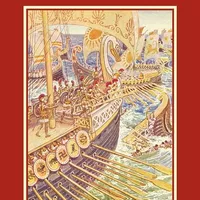39. Conquest of the East
"See the conquering hero comes, Sound the trumpet, beat the drums." —NATH. LEE, Alexander the Great.
Before starting forth on his great expedition, Alexander divided his royal forests and domains among his friends, as though he expected never to return.
"And what is left for yourself?" asked one of these friends.
"Hope," was the fine answer. "Then," cried the friend, rejecting his portion of the land, "we who go forth to fight with you need share only in your hope." Such was the enthusiasm with which Alexander left his country.
The Persian empire was very weak at this time, and governed by a feeble monarch. Two generations had passed away since Xenophon had led his famous Ten Thousand into the heart of the country. Alexander had no doubts as to his being able to conquer it. He soon reached the Hellespont, or, as we now call it, the Dardanelles, and steering with his own hands the flagship across the narrowest spot, where one hundred and forty-six years before, Xerxes had stretched his famous bridge of boats, he was the first to leap ashore. He had already hurled a spear into the soil from the prow of the ship, where, in full armour, he stood. While the mighty Greek army was crossing the narrow water, in the one hundred and sixty triremes hired for the purpose, Alexander was hurrying to Troy, to honour the memory of the heroes, who were buried there, to crown with a garland the gravestone of his forefather Achilles, and to sacrifice to Athena. This episode shows how imbued Alexander was with Greek traditions—indeed, it is said, he always carried with him a copy of Homer's works, so much did he admire the old blind poet of Greece. Meanwhile the Persian troops were encamped on the farther bank of a little river, and it was necessary to fight in the gate of Asia, as it were, for an entrance. The day was far advanced when Alexander made up his mind to attack. His old general advised him to wait till morning broke to cross the river.
"I should be ashamed," cried the young king, "having crossed the Hellespont, to be detained by this paltry little stream. If I halt now, the Persians will take courage and flatter themselves they are a match for the Macedonians." Sending on some of his cavalry to engage the enemy, Alexander, in his glittering armour, mounted his horse, called to his men to remember their valour, and while the trumpets blared, and the war-cry echoed far, he plunged into the stream. Showers of arrows fell on them as they struggled through the water, while the Persians hurled javelins down on them from the opposite banks. But at last they gained the muddy bank on the farther shore, and with spears attacked the foe. Alexander was in the thick of the fight, his large plume of white feathers making him ever a marked man; but he gained a splendid victory and escaped without a wound. Some of the Persian rugs and golden goblets—rich booty of his victory—he sent home to his mother; three hundred suits of armour were sent to Athens to be hung up in the Acropolis.
Alexander had now made his name. He was but twenty-two, blue-eyed and golden haired, with a clear white skin, and very beautiful to look on. But, better than all this, he was frank and generous; fear to him was unknown; he was loyal to his friends, and he was greatly beloved.
With the dust of battle still on him he led his army forwards. Ephesus soon fell into his hands, in gratitude for which, he helped to rebuild the great temple of Diana, which had been destroyed the day of his own birth. It was not long before the whole of Asia Minor had fallen into his hands. There is a story told of him, when he was at a place called Gordia, from which the saying "Gordian knot" has been taken. On the hill above the town, stood the royal palace of King Midas, where stood a famous chariot to which the yoke was fastened by the knotted bough of a cornel-tree. It was said that whoever could untie this knot, should be lord of Asia. To the delight of all, Alexander somehow managed to cut the knot and so fulfil the prophecy.
It was spring-time when he dashed down over some high mountains, to take possession of the town of Tarsus. After a long ride in the burning sun he bathed in the cool waters of a stream, which brought on a violent chill, and nearly ended his life. As soon as he was well enough, he dashed onwards, for he knew that a large Persian host was advancing against him. A magnificent host it was. In the centre of it was the king in a high and richly adorned chariot, wearing a purple mantle trimmed with precious stones. He was surrounded by a band of Immortals, in golden robes, carrying silver-handled lances. Following him, in covered chariots, were his mother, his wives and children, six hundred mules and three hundred camels with their luggage.
The Persians made sure of crushing Alexander this time. But it was not to be. Alexander gained another great victory; the Immortals gave way; the king sprang from his chariot, mounted a horse, and never rested till he was on the far side of the river Euphrates. He had left his old mother behind at the mercy of the victor.
Having conquered Asia Minor, Alexander proceeded to Phœnicia and took Tyre after a long siege. Then he went down into Egypt.

